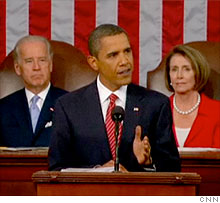Health reform: Should insurers pay?
Obama has thrown his support behind the idea of charging fees on expensive plans. The idea: pay for reform and contain costs. But it won't be easy.
 |
| Obama said a fee on expensive health plans could encourage more efficient use of insurance. |
NEW YORK (CNNMoney.com) -- The negotiations over health reform are kicking into high gear. And one of the top issues is whether to make insurance companies pay for some of it.
President Obama in his joint address to Congress Wednesday said that he supports the idea as a way to help fund the cost of reform -- which, depending on the bill under consideration, would range from $880 billion to roughly $1 trillion over 10 years.
"This reform will charge insurance companies a fee for their most expensive policies, which will encourage them to provide greater value for the money -- an idea which has the support of Democratic and Republican experts," Obama said. "And according to these same experts, this modest change could help hold down the cost of health care for all of us in the long-run."
Senate Finance Committee Chairman Max Baucus, D-Mont., who has been a leader in the reform debate, has proposed a 35% tax on insurers for any plans that costs more than $8,000 for individual coverage and $21,000 for family coverage. The thresholds would be set higher in the 17 highest-cost states for the first three years.
The proposal is part of a larger draft bill Baucus put out in recent days. He has been scrambling to get bipartisan consensus, which may continue to prove elusive.
The point of the insurance tax is to raise revenue. The tax is also intended to help reduce health spending over time, but whether it will is not clear.
Critics say any tax on insurers will be passed along to consumers by way of higher plan costs.
"Unless they're going to repeal the laws of economics, of course that's what's going to happen," said Ken Kies, a tax lobbyist for Blue Cross Blue Shield and managing director of the Federal Policy Group.
If that is the case, however, it may alter the choice of plans by employers, who pay the lion's share of insurance for their workers.
"Employers may choose a plan that's less generous. That might mean a little higher out-of-pocket cost [for workers] but lower premiums than they'd spend otherwise," said Dr. Mark McClellan, director of the Engelberg Center for Health Care Reform at the Brookings Institution.
And it may make employers -- already cost-conscious about their health-related expenses -- more motivated to push for quality improvement and greater efficiencies, McClellan said. That, in turn, can reduce costs.
But if the intention of taxing high-cost plans is to discourage use of overly generous plans, the proposal might not hit its mark, said Paul Fronstin, director of the health research program at the Employee Benefit Research Institute.
That's because defining a "Cadillac" plan by its cost may mean taxing plans that are not necessarily gold-plated but which cover groups in which the average policyholder is older or chronically ill. Those groups use more health care and cost insurers more than groups in which the average policyholder is young and healthy.
And if the insurer tax gets passed along to consumers, the question then becomes whether the additional cost would change the way chronically ill people use health care, Fronstin said.
He doesn't think it will. Even if a chronically ill person is put into a less generous plan with a higher deductible, his annual health care costs are still likely to exceed that deductible, Fronstin said. And the increase in his out-of-pocket expenses may not be enough to justify reducing his use of health care since a significant portion of his expenses will still be above the deductible, and therefore covered by the plan.
Noting that 20% of the population accounts for 80% of overall health spending, Fronstin said, "costs won't go down if you don't change how the chronically ill use health care."
- CNN's Dana Bash, Ted Barrett and Lisa Desjardins contributed to this report. ![]()


